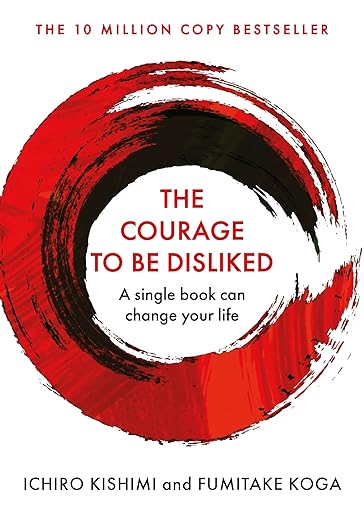In a world where seeking approval is often seen as a natural part of life, The Courage to Be Disliked offers a refreshing perspective. Co-authored by Ichiro Kishimi and Fumitake Koga, this book presents a radical idea: you don’t need anyone’s approval to live a fulfilling life. Based on Adlerian psychology, it challenges the conventional belief that our happiness is determined by our past experiences or external circumstances. Instead, it asserts that true freedom and happiness come from releasing the need for external validation and taking full responsibility for our lives.
If you’ve ever felt trapped by societal expectations, the fear of judgment, or the pressure to meet others’ standards, this book provides a liberating mindset shift. It encourages you to break free from the constant cycle of seeking approval and focus on living authentically, for yourself.

Key Lessons from the Book
1. Your Past Does Not Define You
Many people live under the illusion that their past experiences define who they are today. However, according to Adlerian psychology, it’s not the past that shapes you, but how you interpret and assign meaning to those experiences. Two people could go through the same hardship, yet one might view it as a setback, while the other might see it as an opportunity to grow. It’s your perspective and response to past events that truly influences your future—not the events themselves.
🔹 Action Step: Take a negative past experience and rewrite it. Instead of seeing it as something that holds you back, look for the lessons it taught you. How did it help shape the person you are today? What strengths did it bring out in you?
2. Interpersonal Relationships Should Be Based on Mutual Respect
A lot of unhappiness comes from seeking approval and fearing rejection in relationships. The Courage to Be Disliked argues that the healthiest relationships are based on self-acceptance and mutual respect, not on trying to please others or meeting unrealistic expectations. You are not responsible for others’ feelings, nor should you base your actions on others’ approval. Relationships should thrive when both individuals value each other’s autonomy and treat each other with respect.
🔹 Action Step: Practice the “separation of tasks” concept. This means recognizing which problems belong to you and which belong to others. You are responsible for your actions, but you are not responsible for how others perceive you. Start by identifying situations where you feel responsible for others’ emotions and learn to let go.
3. Live for Yourself, Not for Others
The biggest barrier to happiness is worrying too much about what others think. This book teaches that true freedom comes from focusing on your own values and desires, not on seeking external validation. When you stop living for the approval of others, you will gain the courage to be unapologetically yourself. Imagine the mental energy you’d free up if you stopped trying to control how others perceive you.
🔹 Action Step: Identify one area of your life where you’re making choices based on others’ expectations, rather than what you truly want. How can you start making decisions based on your own values instead? Begin taking small steps to live in alignment with yourself.
4. Happiness Is a Choice, Not a Destination
So many people believe that happiness is something they’ll find once certain conditions are met—whether it’s getting a promotion, finding a partner, or receiving recognition. However, The Courage to Be Disliked argues that happiness isn’t a future event or a destination you’ll eventually reach. It’s a mindset, a way of being, and it’s available to you right now. When you stop waiting for external circumstances to validate your happiness, you’ll realize that you can cultivate happiness today, just as you are.
🔹 Action Step: Start each day with the affirmation that you are enough as you are. Write down one thing you appreciate about yourself every morning. Practice gratitude and recognize the good in your current situation, no matter how small.
5. Don’t Try to Change Others—Focus on What You Can Control
One of the most frustrating aspects of life is trying to change others—whether it’s their opinions, actions, or attitudes. The Courage to Be Disliked emphasizes that you can’t control others, but you can control your own responses and actions. Rather than exhausting yourself trying to please or change others, redirect that energy toward bettering yourself and aligning your life with your values.
🔹 Action Step: Whenever you feel frustrated by someone else’s behavior, ask yourself: Is this something I can control? If the answer is no, let it go. Focus on what you can control—your own reactions and choices.
The Core Message
The core message of The Courage to Be Disliked is simple yet powerful: happiness does not come from changing others or seeking validation—it comes from accepting yourself, focusing on what you can control, and living authentically. When you stop worrying about what others think, you will free yourself to live a life that truly reflects your values and desires.
🔹 Final Action Step: Write down three things you would do differently if you weren’t worried about other people’s opinions. Choose one and commit to taking action on it this week. It’s time to stop waiting for others’ approval and start living for yourself.
Conclusion
The Courage to Be Disliked offers a radical shift in perspective: true freedom comes not from gaining the approval of others, but from fully accepting yourself and taking responsibility for your life. By embracing the principles of Adlerian psychology, you can break free from the pressures of societal expectations, let go of the need for validation, and live a life that is aligned with your true values. Remember, happiness is not a distant goal—it’s something you can choose to experience right now, by living authentically and embracing who you truly are.
FAQs
1. How can I stop worrying about what others think? Start by recognizing that you cannot control other people’s perceptions. Focus on living in alignment with your values instead of seeking approval. Practice self-acceptance and remind yourself that you are enough as you are.
2. Can I really change my past by shifting my perspective? Yes. Adlerian psychology teaches that it’s not the events themselves that shape us, but how we interpret and assign meaning to those events. By reframing negative experiences, you can use them as stepping stones for growth rather than obstacles.
3. How can I build healthier relationships without seeking approval? Start by practicing the separation of tasks. Recognize that you are only responsible for your actions, not how others perceive you. Focus on mutual respect, self-acceptance, and healthy communication in your relationships.
4. What’s the first step in living for myself? Identify areas in your life where you are living based on others’ expectations, and start making decisions that reflect your values and desires instead. Begin by making one change this week that aligns with your true self.
5. How can I cultivate happiness today? Instead of waiting for external conditions to change, focus on being present and appreciating what you have. Practice gratitude and affirmations, and remind yourself that happiness is a choice you can make right now.










